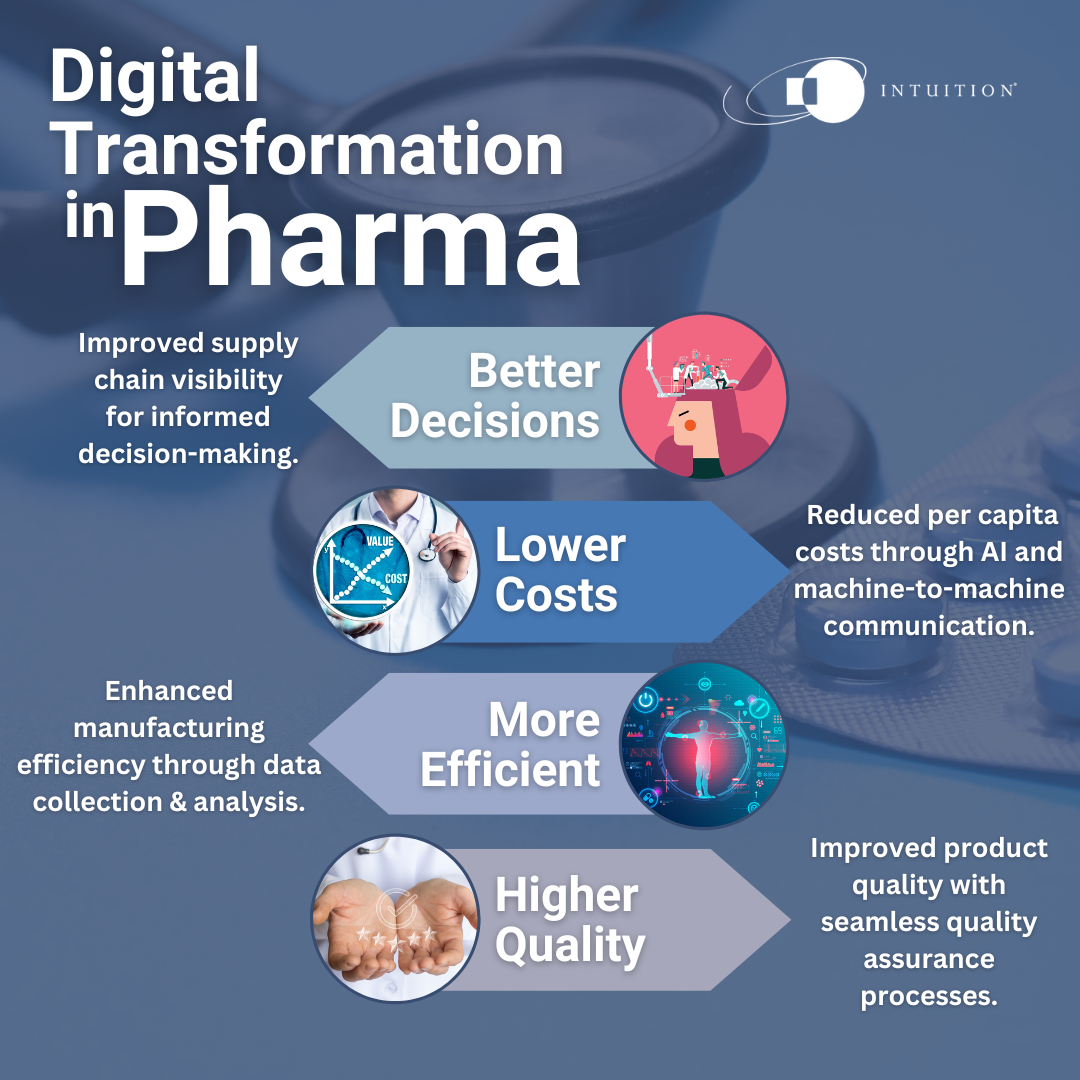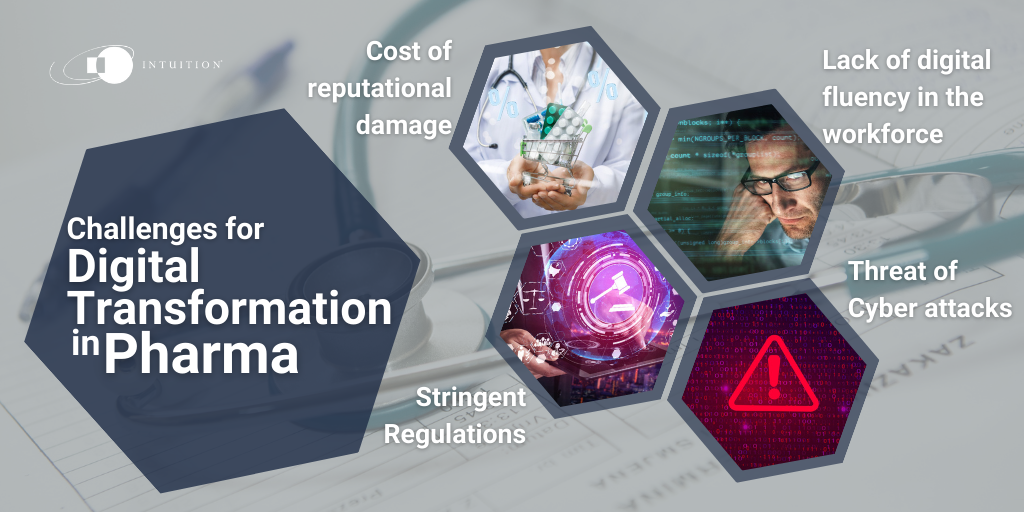Digital Transformation: The best foot forward for pharma
The pharmaceutical industry existed long before we were introduced to our first dose of digital. But, to what extent is the pharmaceutical industry adapting to the times? And how are executives future proofing their business models in an ever-changing digital sphere?
Digital transformation is the industry buzzword on everyone’s lips.
While the entire world thrives on its relationship with technology, the pharmaceutical industry lags, and clings to a more traditional approach. Perhaps this is for a good reason.
The world crutches on the pharmaceutical industry as it strives to advance treatment pathways, improve disease management protocols, and empower the patient experience for everyone. Without the hard work and research done by these professionals, we would not have the medicines, vaccines, and resources needed to continuously advance standards of patient care.
[Digital Therapeutics and Their Role in the Future of Modern Medicine]

What is digital transformation?
Digital transformation is the process of integrating digital technologies across all areas of a business to improve operations and deliver greater value to customers. An example of this could be as basic as replacing a paper book with a tablet at a visual inspection workstation. Instead of documenting inspection findings in a paper book, employees would use the tablet to immediately enter these results into an enterprise resource planning system.
Why have pharmaceutical companies put digital transformation on the back burner?
Digitalizing an organization is not an overnight job. It could mean pausing production lines to train staff, transferring data, and even fundamentally changing the culture of an organization. While production lines might stagnate and sales may stall in the short term, executives should be mindful that these events are contained within the relative cost of making such an adjustment. In other words, it takes time for these new digital processes to take root.
For this change to work in a company, businesses will need to be extremely transparent and overcome deep, embedded ways of working. As well as this, they will have to manage resistance from employees who are used to decades-old methods.

How is digital improving the pharmaceutical manufacturing industry?
Digital transformation offers many growth opportunities for the pharmaceutical industry, delivering significant process advantages that eliminate siloed systems and long-standing manufacturing inefficiencies.
Better decisions
Digital transformation enables companies to make more informed business decisions by increasing their supply chain visibility. With this increased visibility, businesses can use these valuable insights to learn from their existing processes and improve their inefficiencies.
Lower costs
Digital transformation can lower per capita costs in the pharma industry. This can be done through machine learning, AI, and machine-to-machine communication. The organization can promote seamless manufacturing operations, automated corrective actions , and better preventative maintenance thanks to these changes.
More efficient
Pharmaceutical companies can increase their manufacturing efficiency and productivity through digital transformation. Digital transformation allows businesses to collect data across all facilities , giving decision-makers key insights into their companies’ overall operational efficiency.
Higher quality
The quality of the products would also be of a higher standard as there would be a seamless quality assurance process in place. These digital capabilities would make the job of quality control managers much easier. Process improvement in this sense would extend to things such as real-time data access, automatic reporting, and lesser reliance being placed on paper-based documentation.
The manufacturing of pharmaceutical products is a complex and rigorous process that requires meticulous attention to detail. A single error in any of the steps, such as product development, equipment cleaning, or package labelling can render an entire batch of products unusable. This can result in significant costs to the company, as well as pose a potential threat to consumers.

Digital transformation helps pharmaceutical organizations gain better control of their manufacturing processes with more efficient product monitoring, visualization, and remote data access. Digital transformation can also help organizations maintain GMP (Good Manufacturing Practice), which is standard within the industry.
GMP
GMP standards demand a quality-oriented approach to manufacturing, allowing businesses to reduce or eliminate contamination, mix-ups, and errors. GMP covers all areas of production and is enforced by the US Food and Drug Administration (US), European Medicines Agency (Europe), The Health Products and Food Branch Inspectorate (Canada), and the Medicines and Healthcare products Regulatory Agency (UK).
As a result, the buyer is protected against selecting a product that is ineffective or even harmful. In addition, GMP systems specify a set of quality-based operation controls, like management systems, operating procedures, reliability testing, quality raw material assurance, detection, and the investigation of deviation. Implementing a robust GMP standard assures, for both the sake of the organization and the customer, that the final product is of the highest certifiable quality.
[How to leverage technology to engage HCPs]
The Challenges of Digital Transformation
The pharmaceutical industry is stringently regulated for a reason. It is because even the most innocuous of mistakes can have life-changing effects.
There is no way around it, the stakes are high. Procedurally, organizations need to be water-tight before they rush to adopt new technology. It is perhaps this kind of risk that makes executives skittish about the call for digital transformation. Especially when the margin for error is so thin, and the cost of reputational damage is so high.
The industry has prolonged digitalizing its processes and workforce. It is understood that the workforce within the pharmaceutical industry is lacking digital fluency. Through training the workforce on new process standards and showcasing the potential a transition to digital can have, organizations can begin to iron out the digital skill gaps within their workforce. There is an increasing expectation for all industries to be reaching their full digital potential globally.
Upskilling their current staff can be laborious for all involved, but it is game-changing for the workforce. It requires a cultural shift from the top down, getting everyone involved, and committing sufficient resources to develop new training initiatives.
One of the major challenges when digitalizing an organization is the need to develop cybersecurity, artificial intelligence, and other strategies. Pharmaceutical professionals have a growing concern of cyber-attacks – hackers gaining access to their digital assets. It is vital to these organizations while digitalizing, to maintain a safe cloud while transferring their sensitive data.

Final Thoughts
Digital transformation offers pharmaceutical organizations incredible potential.
Done right, it should enhance processes to help improve decision-making, allowing everything from back-end administration to patient-facing services to run smoother.
While the pharmaceutical industry is going through a significant transformation, individual companies are still in an experimental phase when it comes to offering digital services beyond traditional products.
Although there will be challenges, digitalizing will help these organizations increase their productivity, ensure compliance, and in turn become more resilient.


